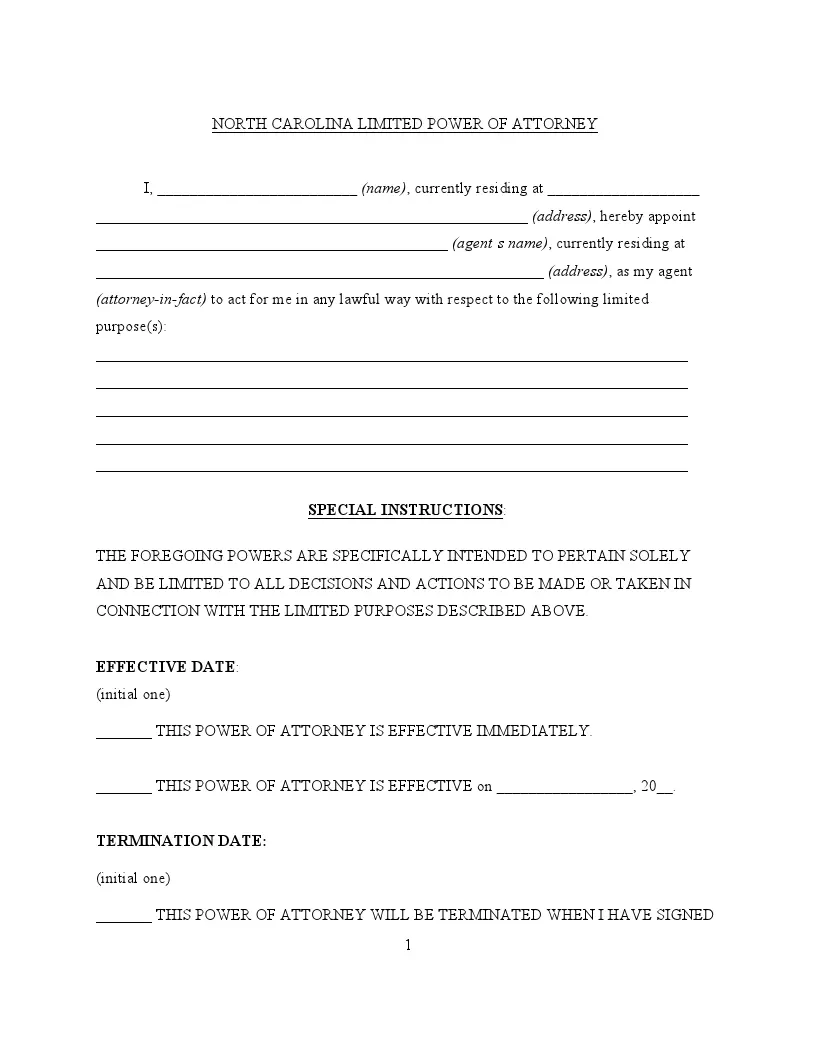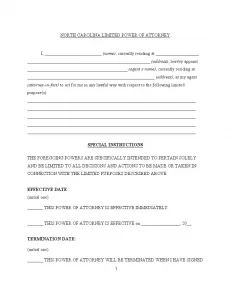North Carolina Limited Power of Attorney Form
The North Carolina limited power of attorney is a legal tool that allows someone to designate another person to act on their behalf for specific tasks or decisions. This document is tailored to fit precise needs and details the actions the designated representative, known as the “agent,” is authorized to perform.
The scope of a limited power of attorney is narrowly defined — perhaps to sell a property, handle financial transactions, or manage legal claims. In North Carolina, it’s critical that this document clearly outlines the agent’s powers and duration, as it automatically expires once the specified task is completed or at a date mentioned in the agreement.
Secure your affairs with our North Carolina power of attorney forms, ensuring your decisions are legally upheld.

Build Your Document
Answer a few simple questions to make your document in minutes
Save and Print
Save progress and finish on any device, download and print anytime
Sign and Use
Your valid, lawyer-approved document is ready
In North Carolina, the signing and legal requisites for a limited power of attorney are governed by Chapter 32C of the North Carolina General Statutes (Uniform Power of Attorney Act). This legal framework ensures that any action taken by the agent on behalf of the principal is strictly within the bounds granted by the specific power of attorney document. The main requirements include:
- Notarization of the document.
- Clear specification of the agent’s powers.
- Identification of the principal and agent.
According to § 32C-1-105 of the statute, it is mandatory for the limited power of attorney to be corroborated by a notary at the time of signing to ensure its validity. The law designates an “agent” as someone authorized to act for a principal, whether referred to as an agent, attorney-in-fact, or under any other title.
North Carolina Limited Power of Attorney Form Details
| Document Name | North Carolina Limited Power of Attorney Form |
| Other Name | North Carolina Special Power of Attorney |
| Relevant Laws | North Carolina General Statutes, Section 32C‑2‑201 |
| Avg. Time to Fill Out | 8 minutes |
| # of Fillable Fields | 32 |
| Available Formats | Adobe PDF |
Filling Out North Carolina Limited POA
This guide walks you through each section of the North Carolina limited power of attorney form to help you accurately appoint an agent to act on your behalf for specific duties.
1. Fill Out the Principal and Agent Information
Enter your full name and current residential address in the designated spaces. Next, write the name and address of the person you appoint as your agent (also known as attorney-in-fact). Ensure this person is someone you trust, as they will act on your behalf within your specified scope.
2. Specify the Powers Granted
Detail the specific powers you are granting to your agent in the “Special Instructions” section. Be as clear and precise as possible to avoid ambiguity about your agent’s authority.
3. Set the Duration of the Power of Attorney
Indicate whether the power becomes effective immediately or on a specific future date. Then, decide if the power will end on a specific date, upon a written revocation, or if you are declared incapacitated. Initial the option that applies.
4. Appoint a Successor Attorney-in-Fact
If you believe it’s necessary, appoint a successor attorney-in-fact by entering their name and address. This person will take over if your original agent can’t or won’t serve.
5. Execution by Principal
Sign and print your name at the bottom of the form and fill in the date to execute it officially. This action confirms your intention to grant power of attorney according to the terms outlined in the document.
6. Acknowledgment by Notary
Take the document to a notary public. The notary will verify your identity, witness your signature, and stamp and sign the form, finalizing its legality. Ensure you have valid identification for this process.
